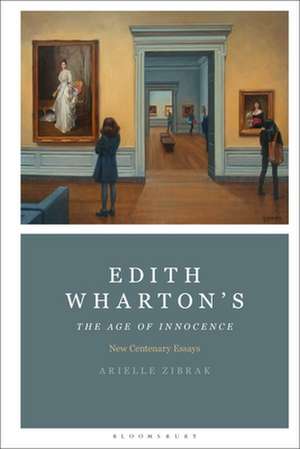Edith Wharton's The Age of Innocence: New Centenary Essays
Editat de Professor Arielle Zibraken Limba Engleză Paperback – 19 mai 2021
| Toate formatele și edițiile | Preț | Express |
|---|---|---|
| Paperback (1) | 216.99 lei 6-8 săpt. | |
| Bloomsbury Publishing – 19 mai 2021 | 216.99 lei 6-8 săpt. | |
| Hardback (1) | 657.29 lei 6-8 săpt. | |
| Bloomsbury Publishing – 27 noi 2019 | 657.29 lei 6-8 săpt. |
Preț: 216.99 lei
Preț vechi: 274.53 lei
-21% Nou
Puncte Express: 325
Preț estimativ în valută:
41.52€ • 43.35$ • 34.36£
41.52€ • 43.35$ • 34.36£
Carte tipărită la comandă
Livrare economică 05-19 aprilie
Preluare comenzi: 021 569.72.76
Specificații
ISBN-13: 9781350234482
ISBN-10: 1350234486
Pagini: 224
Dimensiuni: 156 x 234 x 16 mm
Greutate: 0.31 kg
Editura: Bloomsbury Publishing
Colecția Bloomsbury Academic
Locul publicării:London, United Kingdom
ISBN-10: 1350234486
Pagini: 224
Dimensiuni: 156 x 234 x 16 mm
Greutate: 0.31 kg
Editura: Bloomsbury Publishing
Colecția Bloomsbury Academic
Locul publicării:London, United Kingdom
Caracteristici
Brings together cutting-edge critical perspectives on Edith Wharton's most popular novel, The Age of Innocence
Notă biografică
Arielle Zibrak is Assistant Professor of English at the University of Wyoming, USA.
Cuprins
List of TablesAcknowledgementsContributor BiographiesIntroduction: "Each Time You Happen to Me All Over Again"Arielle Zibrak, University of Wyoming1. Edith Wharton, The Age of Innocence, and American IndividualismCarol J. Singley, Rutgers University-Camden2. Edith Wharton's Prose Spectacle in the Age of CinemaMargaret A. Toth, Manhattan College3. "You must tell me just what to do": Action and Characterization in Wharton's The Age of Innocence"Gabi Kirilloff, Texas Christian University4. "Isn't That French?": Edith Wharton Revisits the "International Theme"Virginia Ricard, Bordeaux Montaigne University5. Newland Archer's Doubled Consciousness: Wharton, Psychology, and Narrational FormShari Goldberg, Franklin & Marshall College6. "Trying It On" Again as Affect: Rethinking Feeling in The Age of InnocenceMargaret Jay Jesse, University of Alabama at Birmingham7. Innocence and Scandal in Edith Wharton's Old New YorkHildegard Hoeller, CUNY8. The Age of DissonanceBeth Nguyen, University of Wisconsin, MadisonNotesCritical BibliographyIndex
Recenzii
Classic literary works maintain their status by speaking to subsequent generations anew. Wharton's The Age of Innocence (1920) has been highly regarded since it was first published, appreciated by both scholars and general readers throughout the past century and into the 21st. Few readers of 20th-century novels can resist the sumptuous New York of 1870 that Wharton brings to life or tire of the love triangle between the main characters: Newland Archer, May Welland, and Ellen Olenska. The essays Zibrak brings together offer varied perspectives on this classic tale, some pointing toward criticism to come. Some contributors approach the book in traditional ways. For example, Carol Singley provides a cogent reading of the main characters in the context of American individualism, and Hildegard Hoeller compares the novel to Wharton's bolder collection of novellas, Old New York (1924). Other essayists employ verb-mapping data and analyze Wharton's 'free indirect discourse.' A consideration of an early film adaptation of Wharton's famous novel and a personal essay round out the collection. Summing Up: Recommended. Graduate students, researchers, faculty.
Individualism, ambivalence, scandal, and belonging--all of these are associated with Wharton's The Age of Innocence, in this stunning new collection of essays. Zibrak orchestrates a whole new set of innovative readings of the novel--and the 1934 film based on it. These essays treat its modernist affect and narrative style, along with its status as an international novel with France as its focus. In moving from a new digital study of Wharton's verbs to the historical status of psychology before 1920, to the novel's relation to Wharton's "Old New York" novellas and her various plots for Age, this collection soars. It heralds a new energy that will advance Wharton Studies anew.
Bringing significant insights to the novel's characterization, narration, modernist and international contexts, gender politics, and 1934 film adaptation, this collection employs digital humanities, transhistorical, and interdisciplinary methodologies in exciting new ways and reintroduces us to the beauty and complexity of The Age of Innocence. These stimulating essays remind us of the enduring importance of Wharton's Pulitzer Prize-winning work in a new age and inspire further avenues of scholarship.
Individualism, ambivalence, scandal, and belonging--all of these are associated with Wharton's The Age of Innocence, in this stunning new collection of essays. Zibrak orchestrates a whole new set of innovative readings of the novel--and the 1934 film based on it. These essays treat its modernist affect and narrative style, along with its status as an international novel with France as its focus. In moving from a new digital study of Wharton's verbs to the historical status of psychology before 1920, to the novel's relation to Wharton's "Old New York" novellas and her various plots for Age, this collection soars. It heralds a new energy that will advance Wharton Studies anew.
Bringing significant insights to the novel's characterization, narration, modernist and international contexts, gender politics, and 1934 film adaptation, this collection employs digital humanities, transhistorical, and interdisciplinary methodologies in exciting new ways and reintroduces us to the beauty and complexity of The Age of Innocence. These stimulating essays remind us of the enduring importance of Wharton's Pulitzer Prize-winning work in a new age and inspire further avenues of scholarship.
